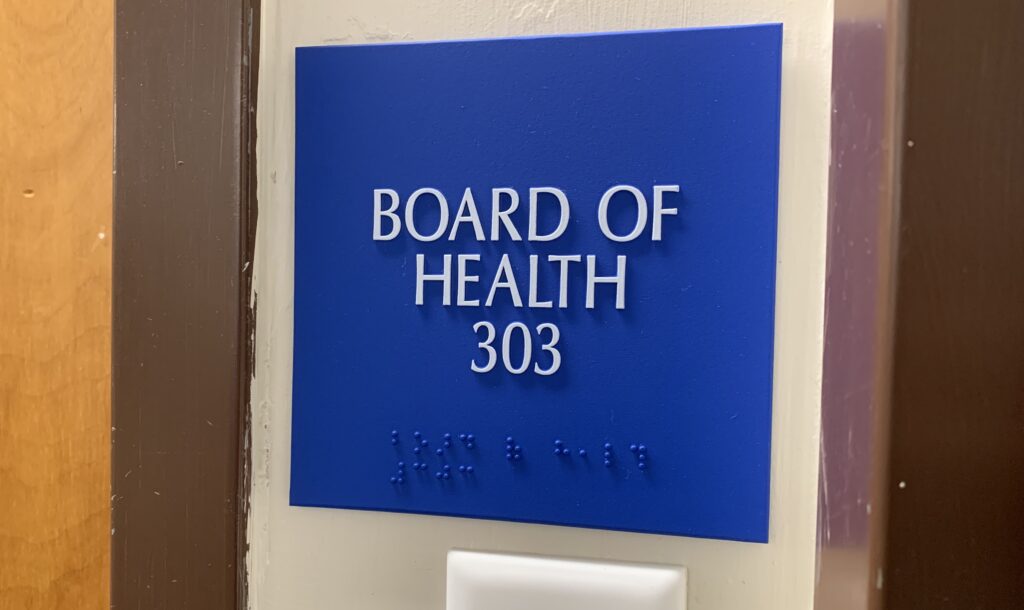Health Director Shaun McAuliffe walked members of the Board of Health through the Health Department’s new strategic plan Monday night.
The plan, which was finalized in August, identifies five strategic priorities for the department. These center around data reporting, communication and partnerships between other departments and organizations.
One major proposal in the plan is an expansion of the Board of Health. The board now has three members. If the recommendations in the plan are adopted, the board would add two additional seats.
McAuliffe insisted that expanding the board to five members would be better for collaboration and decision making.
“Five [members] would allow a little more discussion, interaction and freedom,” said McAuliffe, “and a greater depth, or spread, of participation.”
He spoke about recommendations for improving communication efforts as well. McAuliffe explained there are opportunities to connect with and educate residents about the department’s work.
“I would argue most people don’t know what we do here,” he said.
McAuliffe informed the board that he and public health nurse Simone Carter will be presenting the strategic plan to the Select Board at its meeting Tuesday night.
Carter discussed her part of the presentation. She will be presenting on the plan’s top priority: expanding the town’s public health nursing team.
The Health Department was forced to cut back services back in March after a “five-figure” budget deficit caused two per diem nurses to be furloughed.
Both McAuliffe and Carter have maintained this has created extra burden on the whole department. As regulatory requirements for reporting have increased, it has been more difficult for Carter to administer consistent care.
Carter noted that “30% of [nursing] time is updating records.”
She and McAuliffe report that the people affected most by this loss in care are Hopkinton’s seniors.
“We’re seeing a lot of elders at risk,” said Carter. “They’re the ones who have felt the cut the most.”
To bridge the gap, Carter intends on asking the Select Board to reinstate nursing through emergency appropriations and to budget for nursing in fiscal year 2026 with an eye toward future growth and demographic changes.
Additionally, she and McAuliffe will ask the Select Board to establish a revolving fund to capture vaccine reimbursements to augment the Health Department’s finances.
“This will allow us to bill for services and future endeavors that allow seniors to age in place,” said Carter.
Board members discussed the budgetary aspects of Carter’s presentation. Member Nasiba Mannan supported an idea to focus on the budgetary aspects of the plan during the presentation to the Select Board.
“You have to make the case like that so they get it,” Mannan said.
The board also had questions regarding the burden of reporting requirements and the necessity of additional staff.
Chair Richard Jacobs inquired about the current time investment for completing and filing reports to the Massachusetts Department of Public Health (DPH).
Member Mary Jo Ondrechen wondered if that burden necessitated more staff. “Has the town grown to the point that we need two nurses?” she asked.
Carter and McAuliffe asserted that additional public health nurses were a necessity.
McAuliffe explained that each report the department needs to file takes on average 2-3 hours each, and the per diem nurses were averaging 30 hours per week completing that paperwork.
“All that work is going back on Simone now,” said McAuliffe.
After further discussion, the board took a unanimous vote to support the presentation of the strategic plan to the Select Board.
Hopkinton now a ‘low-risk’ mosquito area
McAuliffe informed the board that efforts to curb mosquito and tick-borne illnesses in town have yielded positive results.
“If you look at the mosquito dashboard at DPH, we’re a spot of low risk,” McAuliffe said.
Spurred by data showing that mosquito capture rates at monitored sites in town were 15,000 times above rates in previous years, the Health Department has been working to curb the mosquito populations.
McAuliffe reported he had coordinated with the Central Massachusetts Mosquito Control Project (CMMCP) to apply specific larvicide pucks every three weeks in water bodies that were known to have mosquitoes.
These measures were intended to disrupt mosquito breeding patterns. CMMCP continued to apply them until this month.

















0 Comments